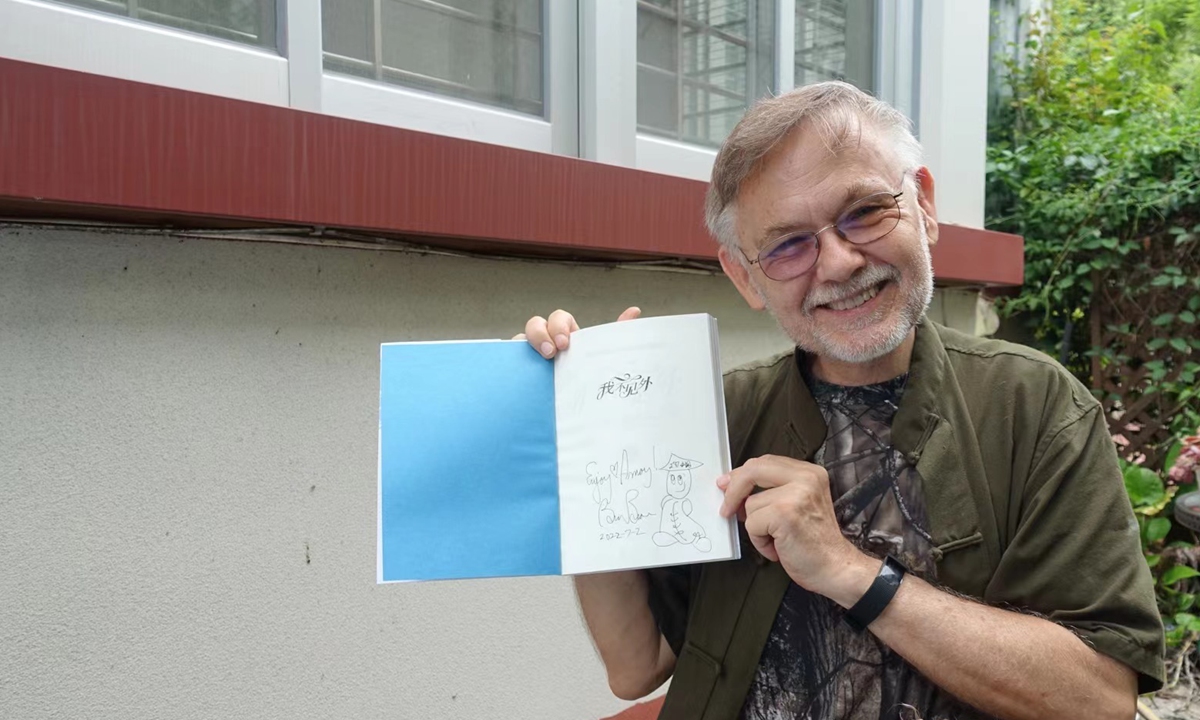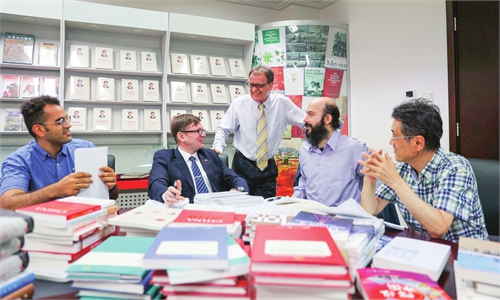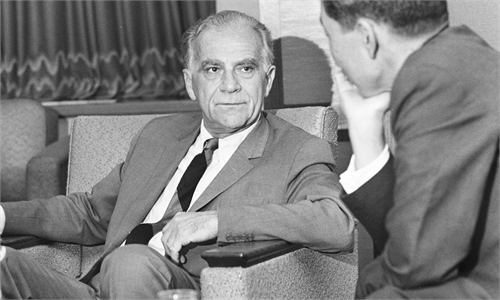US professor ‘with a Chinese heart’ wants to tell the world more wonderful China stories

William N. Brown shows his book Off the Wall - How We Fell for China to a Global Times reporter. Photo: Lin Xiaoyi/GT
Editor's Note:
Chinese people believe that letters are as valuable as gold. For thousands of years, letters, across mountains and oceans, have been delivering the writers' sentiments, friendship, and expectations.
During the past decade, Xi Jinping, general secretary of the Communist Party of China (CPC) Central Committee and Chinese president, has managed to find time to reply to some letters from ordinary people despite his busy work schedule.
Through his letters, Xi has also corresponded with international friends from all walks of life on numerous occasions, part of a series of excellent stories of China's international exchanges in the new era. The letters have also added vivid color to the diplomacy between China and other countries in the last decade.
Over the last few months, the Global Times reporters traced and contacted some of the recipients of Xi's letters, to hear the inspiring stories behind the letters and their contents.
As a foreigner who has lived in China for over 30 years, William N. Brown, a 66-year-old US professor at Xiamen University in East China's Fujian Province, feels happy to witness China's development and subsequent changes. He was even more pleasantly surprised that his efforts to tell the world about the real China had gained recognition from Xi.
"President Xi was the one who encouraged me to share more real China stories with the world from the perspective of an expat. It was a surprise and an honor that as a state leader shouldering such huge responsibility, President Xi still managed to write back to me, an ordinary foreign teacher," William N. Brown, a 66-year-old US professor from Xiamen University in East China's Fujian Province, told the Global Times.
On February 1, 2019, in the letter to Brown, Xi lauded the professor's dedication of 30 years - during the prime of Brown's life - to the educational cause of China. Xi said he was touched by Brown's deep affection for Xiamen and for China, the Xinhua News Agency reported.
As an eyewitness to China's reform and opening-up during the past decades, Brown has spoken about Xiamen and Fujian enthusiastically and painted a real picture of China for the world.
"If China just keeps doing the good they're doing in China and abroad, there will be more people like me who are amazed by the development and changes in China and abroad," Brown told the Global Times.
Feeling at home
Xi's reply came after he received Brown' letter and his book Off the Wall - How We Fell for China, which included roughly 50 letters Brown wrote to his family and friends in the US over the past three decades detailing many amusing and touching stories that have happened to him throughout his time in China.
In 1988, one decade after China had implemented the reform and opening-up policy, Brown moved to Xiamen, one of the first five special economic zones China had established, with his wife and two sons after getting his doctorate and selling his company in the US. He started to work as a professor at the School of Management in Xiamen University. In 1992, he became the first foreigner to obtain the permanent residency in Fujian Province.
Describing himself as "a foreign face with a Chinese heart," Brown is often locally referred to as Xiamen's most famous foreigner.
At the university, Brown established a close relationship with the students and became the first full-time foreign MBA teacher at the school. In his spare time, Brown actively interacted with locals to learn more about Chinese customs and traditions.

Brown's correspondence with his family and friends in the US between 1988 and 2017. Photo: Courtesy of Brown
In the late 1980s, Brown noticed the exponential growth in the Chinese economy that started to sweep through the country.In order for his family in the US, who had initially worried about them coming to China, to learn more about the country, Brown began to write letters to them.
Seeing is believing
"Actually, President Xi was the one who encouraged me to write more and publish more books," Brown said when talking about his experiences publishing books.
Brown first met Xi in provincial capital Fuzhou when Xi was the governor of Fujian Province in November 2001 when Xi made Brown an honorary citizen of Fujian, Brown said.
Brown said he had heard doubts from people in other countries, who asserted that in China, people could see how coast cities were changing but the inland areas were not.
"I asked how they knew inland areas were not developing if they'd never been there. I didn't want people getting their impressions from foreign media that did not really know the situation. And I decided that if I was going to write about it, I needed to see it firsthand for myself," Brown said.
In 1994, Brown launched a tour of China, driving 40,000 kilometers across 18 provinces and autonomous regions over three months.
"During that trip, I saw that even in the most remote areas, the Chinese government had begun to invest in roads and electricity construction. At that time, I wrote to my father that I firmly believed China's people really had a promising future."
In the summer of 2019, Brown set out again, retracing part of the route he took 25 years earlier, to explore the changes that have taken place across China.
Brown said that 25 years ago, they just saw dilapidated earthen houses in the Northwest China's Ningxia Hui Autonomous Region, but now, locals have long been living in new, spacious houses.
"North China's Inner Mongolia Autonomous Region was dusty in 1994, but in 2019 it was full of greenery," Brown said.

Brown (center) interacts with locals in the Inner Mongolia Autonomous Region during his 2019 trip. Photo: Zhu Qingfu/Courtesy of Brown
"In the past, I was confident that China could lead the people out of poverty, but I thought it would realistically take 40 to 50 years to achieve that goal," Brown said. "But through my visits, I realized that for China, getting out of poverty wasn't a political goal to get elected like in some countries, but a series of practical actions mobilizing people at all levels of society to work together to understand and then improve the real situation of the people, caring about their livelihood development.Three years ago, Brown wrote a letter to Xi saying that he was optimistic about China's future. "Now I am even more confident," Brown said, "And I look forward to observing and writing about a better and more prosperous China in the following decades," Brown said.


